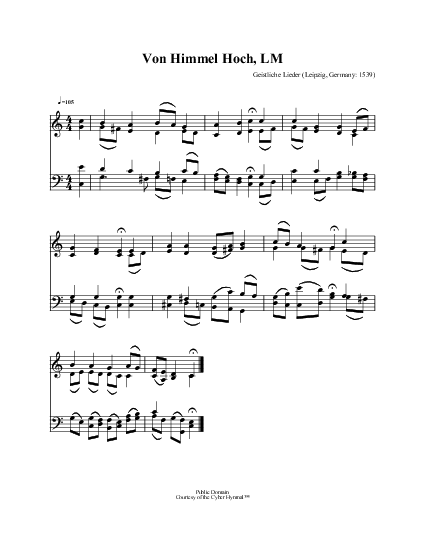Translator (German): Martin Luther

Luther, Martin, born at Eisleben, Nov. 10, 1483; entered the University of Erfurt, 1501 (B.A. 1502, M.A.. 1503); became an Augustinian monk, 1505; ordained priest, 1507; appointed Professor at the University of Wittenberg, 1508, and in 1512 D.D.; published his 95 Theses, 1517; and burnt the Papal Bull which had condemned them, 1520; attended the Diet of Worms, 1521; translated the Bible into German, 1521-34; and died at Eisleben, Feb. 18, 1546. The details of his life and of his work as a reformer are accessible to English readers in a great variety of forms. Luther had a huge influence on German hymnody.
i. Hymn Books.
1. Ellich cristlich lider Lobgesang un Psalm. Wittenberg, 1524. [Hamburg Library.] This contains 8 German h…
Go to person page >Author: St. Ambrose

Ambrose (b. Treves, Germany, 340; d. Milan, Italy, 397), one of the great Latin church fathers, is remembered best for his preaching, his struggle against the Arian heresy, and his introduction of metrical and antiphonal singing into the Western church. Ambrose was trained in legal studies and distinguished himself in a civic career, becoming a consul in Northern Italy. When the bishop of Milan, an Arian, died in 374, the people demanded that Ambrose, who was not ordained or even baptized, become the bishop. He was promptly baptized and ordained, and he remained bishop of Milan until his death. Ambrose successfully resisted the Arian heresy and the attempts of the Roman emperors to dominate the church. His most famous convert and disciple w…
Go to person page >Translator (English): John Gambold

Gambold, John, M.A., was b. April 10, 1711, at Puncheston, Pembrokeshire, where his father was vicar. Educated at Christ Church, Oxford, where he graduated B.A. in 1730, M.A. in 1734. Taking Holy Orders, he became, about 1739, Vicar of Stanton Harcourt, Oxfordshire, but resigned his living in Oct. 1742, and joined the United Brethren [Moravians], by whom lie was chosen one of their bishops in 1754. He d. at Haverfordwest, Sept. 13, 1771. He published an edition of the Greek Testament; Maxims and Theological Ideas; Sermons, and a dramatic poem called Ignatius. About 26 translations and 18 original hymns in the Moravian Hymn Books are assigned to him. One or two of his hymns, which were published by the Wesleys, have been claimed for them, bu…
Go to person page >

 My Starred Hymns
My Starred Hymns









